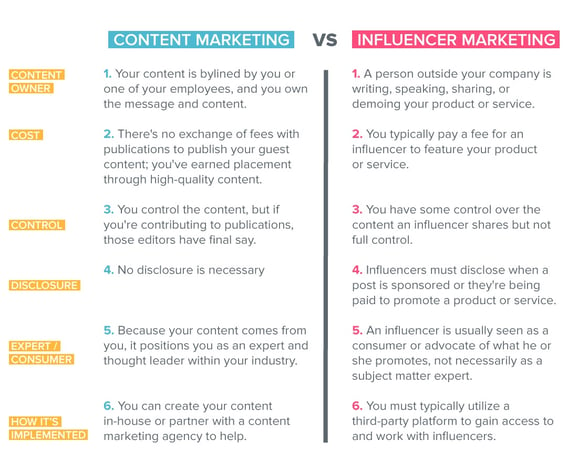 As influencer marketing has skyrocketed over the past year or two, there seems to be increased confusion over how it differs from content marketing.
As influencer marketing has skyrocketed over the past year or two, there seems to be increased confusion over how it differs from content marketing.
To make it as easy as possible, we’ve broken down the key differences in this simple chart that compares content marketing (which is what we do at Influence & Co.) to influencer marketing: It’s important to note that the goals of each marketing strategy are essentially the same. We’ve seen that most people who turn to influencer marketing are looking for brand awareness, third-party validation, credibility, enhanced reach and visibility, increased sales, and a competitive advantage, which are all things that can also be achieved through content.
It’s important to note that the goals of each marketing strategy are essentially the same. We’ve seen that most people who turn to influencer marketing are looking for brand awareness, third-party validation, credibility, enhanced reach and visibility, increased sales, and a competitive advantage, which are all things that can also be achieved through content.
Now, I’m not saying that just because content can help your company achieve these goals means there’s no room to explore influencer marketing. It doesn’t have to be one strategy or the other — influencer marketing can be a strong addition to your overall content strategy if you do it well. But for influencer marketing to be its most effective, you’ve got to invest in building your own influence first.
Invest in Yourself First
That may sound counterintuitive, but hear me out. Yes, the influencers you’re wanting to work with probably already have their own (giant, engaged) followings online with audiences who trust them and their recommendations, and you just want to get your brand in front of them.
But what if, rather than spend a lot of money to borrow someone else’s audience and credibility, you could build your own large and engaged audience — and unparalleled credibility?
The bottom line is this: You’re looking for increased reach, engagement, and advocacy, and outside influencers can never be the same kind of natural, powerful advocates that an organically grown audience can. You and your other internal influencers may not have the same clout that an outside influencer has, but that’s exactly why your focus on content is so critical — it’s that content that builds clout.
Crafting and distributing valuable, high-quality content is how you build your brand, promote your company’s brand, and establish influence that leads to long-term ROI (as opposed to short-term wins achieved through one-time influencer transactions).
Influencer Marketing Is Complementary
Don’t get me wrong; there are plenty of people and companies that do influencer marketing well. But those same people and companies are so successful with it because they’ve also committed to content marketing. They didn’t use influencer marketing instead of content marketing; they built a foundation of content first and amplified it with influencer marketing. Here’s why that works:
- Content is your marketing baseline; influencers just give it a boost. Your company and your audience both benefit from content at every point in your customers’ interactions with you. Once you’ve put that foundation of content to use to hit those touchpoints consistently, influencers can give your work a boost, generating quick, short-term wins — but they can’t give you a boost without a benchmark first.
- Influencer marketing needs content to thrive. If an influencer promotes your company, products, or services and you have no content surrounding your brand, people will probably feel misled. What are these influencers advocating if you don’t have any content explaining who you are, what you do, and how you can help people? (Also, good luck getting an influencer to take your pitch seriously if you have no content regarding the very product or service you’re asking them to sponsor.)
- To gain influencer interest, you need influence yourself. Influencer marketing isn’t a tactic you can use that well without your own influence. If it comes down to you and some other brand that’s already influential, who do you think your desired influencer is going to choose? Influencers value influence; make sure you come to the table with your own.
Influencer marketing definitely has its perks, and it can be a great complement to your company’s marketing strategy. But if it’s true brand influence you’re after, then you’re better off starting from within — and for that, you’re going to need content marketing.
Before implementing influencer marketing, lay the groundwork with an effective content marketing strategy. Download our comprehensive 4-step guide below:




 As
As 

.jpg)


